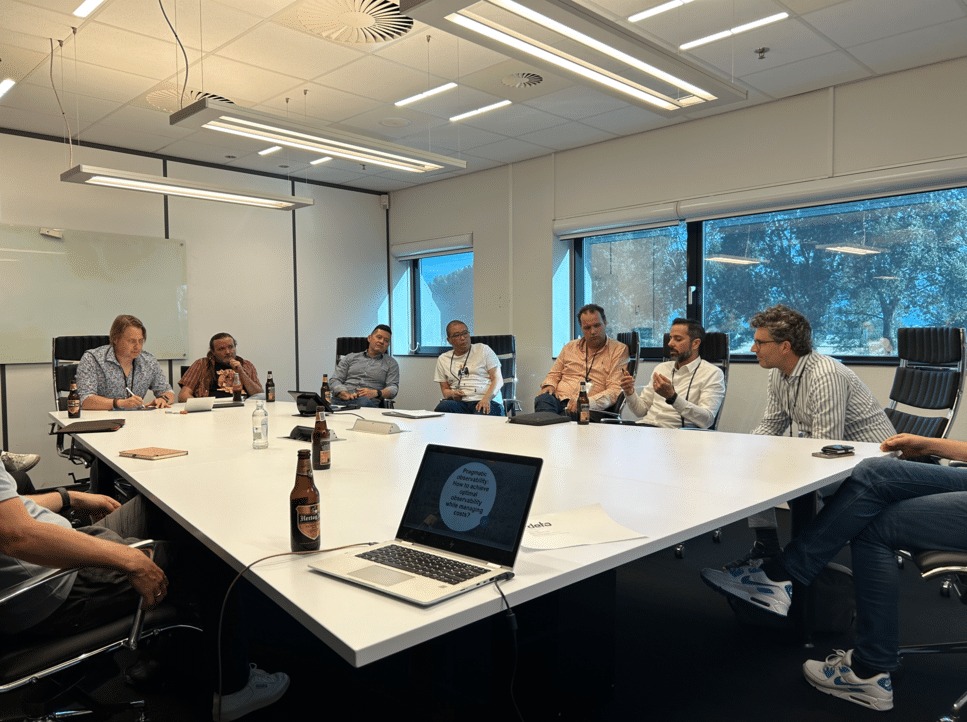In the latest in our #TalentQA series, specialist DevOps consultant, Isaac Kim, speaks with Sam Mckune, Recruitment Lead – Tech at The Plum Guide, a start-up holiday rental company based in the tech hub of London, Old Street.
Sam draws on his experience in technical and development talent acquisition, the challenges he faces with talent acquisition in a scaling business and provides us with an insight into the continued success and growth of The Plum Guide.
Third Republic (TR): Your background is similar to mine in terms of recruitment and technology. Can you tell us a bit about your journey?
Sam Mckune (SM): Once I started recruiting in technology, it definitely found the industry for me. Recruiting for Developers is like maths, you either have Java8 or you don’t, whereas recruiting for Business Analysts and Project Managers is a lot more like English – there’s no real right or wrong experience, so long as you can show what you have done in the past and how it relates. So, for me it’s definitely about development and I haven’t looked back since then.
TR: What sort of challenges are you facing in sourcing technology talent today?
SM: The implementation of GDPR has definitely impacted the way we reach out to technology talent. There were a lot of Chrome extensions to help recruiters find contact information more easily that were scrapped for example. There are still ways to find this information that are GDPR compliant, for example looking at the source code of a Github page and there will likely be an email there.
Sourcing itself and identifying candidates is definitely not harder. LinkedIn is now very much moving towards being more of a recruitment platform. The options available within a recruiter license are very advanced, you can have a page of results for a person specification almost instantly. I would say sourcing itself has gotten easier, however making contact with the candidates has definitely gotten more difficult since the implementation of GDPR.
TR: Why do you think it is more difficult to engage with these candidates?
SM: The sheer amount of choice that candidates have these days. Development has always been huge, but it is bigger than ever and tomorrow it will be bigger than today and so on. If you are anyone who is great at what you do, you will have plenty of choice anyway, let alone when there are far more jobs out there than candidates. One good candidate will generally never have less than 3 offers at one time, so it is just about what you can bring to the table over everyone else, and how you differentiate yourself.
TR: What sort of strategies do you adopt in terms of attracting, engaging and securing talent and bringing them on-board to particular projects?
SM: For me personally, over the past couple of years I have very much changed the way in which I sell an opportunity. I find the best sales tactic in recruitment in this day and age is honesty, if you are absolutely transparent about everything during the process; upcoming details, previous details etc., then honesty tends to be reciprocated.
If a candidate can trust you then they will provide you with more details about their processes. For me it’s not about making a hire by overselling and forcing candidates into roles. If you really are honest and have a great mission and a great team then you will attract the right people – 100%.
TR: I completely agree! Are you recruiting for permanent and contract roles at The Plum Guide?
SM: The Plum Guide has just closed its Series B funding and it was very successful, we got the £14 million that we asked for and were backed by some very big names in the right type of spaces. We have some contractors in at the moment and they are great, doing exactly what we need them to do – they have come into the business and hit the ground running, they have great knowledge, great experience and they can make technical decisions.
Moving forward, however, we want to expand over the upcoming years and for us, we need permanent employees to help us on that journey. We can’t have someone integrally building these fantastic systems for us leave in a year’s time and take that knowledge with them.
So, I am currently hiring for contract roles, while also building out the permanent team – we’re looking to roughly double in size.
TR: Some companies take a different approach when hiring contract employees as opposed to a permanent member of staff. Do you think you use a different approach for contract hires?
SM: There’s definitely no difference in the way that I approach it. Definitely the speed with hiring a contract is outstandingly faster than with a perm role. But in terms of what we’re looking for on the person-side, no. You still have to be a cultural fit, whether you’re a contractor for a week or a permanent employee for 10 years – the values remain the same.
TR: Having discussed the people and relationship elements of hiring, would you say that being a recruiter in today’s day and age requires more advanced relationship and people management skills?
SM: There are two ways that you could look at this – recruiters’ roles are evolving, there is a much higher percentage of recruiters who have a much better technical understanding of the roles that they are recruiting for. For example, you might receive a CV that’s very good, however they’re missing one or two soft-skills that could be taught within a week. Today’s recruiters have more of an understanding that these kinds of candidates would still be suitable rather than rejecting a Lead Developer based in the IDE they’re using.
It used to be very rare that you could speak with a recruiter and a hiring manager about a position and they would both say the same thing – but this is starting to happen more. Recruitment itself is changing, we are moving away from being pushy sales people and focusing more on building relationships with candidates. It’s cool to be a good recruiter.
TR: Do you think the rise in digital and technology will continue to influence recruitment?
SM: I do, but I don’t believe that any AI or machine learning based programs will replace recruitment. The closest you could get to it would be word-matching software, but even then, unless you made everyone submit video interviews and built software that could analyse facial expressions and reactions and that could make a decision for you, I don’t think recruiters will ever be replaced.
We could potentially see some interesting platforms in the future. There has already been a shift towards middle-man platforms that charge a monthly sub rather than contingency based. I think these are super interesting because they’re mostly very transparent and put a lot of power back in the candidates hands.
TR: Could you now give us a bit more of an insight into what it is that The Plum Guide do? Are you in competition with similar businesses, such as AirBnB and Bookings.com?
SM: When launching a new city, we start with an algorithm that builds a database of all the homes available in the city. It’s refreshed daily. We then systematically put this database of homes through five rounds of filtration, including an initial screening for homes with 5-star ratings in the most popular neighbourhoods, a design review, and host interview. The final round is an in-person visit by a Plum Home Critic to score the home on 150 different criteria, ranging from soft features like the design and sociability of the space, to hard factors like WiFi speed and decibel levels.
It’s a radically scientific, data-driven approach to the traditionally manual and subjective curation process. Once we get to the top 1% of homes in a city, it’s one in, one out. These are the best homes. Period.
Booking platforms are flooded with reviews to the point it can be hard to know what reviews to trust. We are replacing what we believe to be a broken customer review system with the Plum Test; an independent, reliable, trustworthy and consistent review system. We have nothing against reviews. But we believe it is our responsibility to take the hit-and-miss out of renting a home.
We take the responsibility of guaranteeing quality away from customer reviews. We believe the future of decision making online will be through expert-led science, not just customer reviews.
TR: Looking at the technology that The Plum Guide typically work with, what sort of challenges, if any, have you experienced when recruiting for The Plum Guide?
SM: We are big believers in Test Driven Development. Our tech is in a very good place. The main issue for us has been growing at the speed we want to whilst retaining our software engineering standards & culture. The market itself its naturally contract heavy, so I think its important to not just hire the first perm FE developer you speak so you can keep to your hiring metrics. Quality > Quantity!
TR: In regard to your candidates; front and back-end developers, DevOps, architects and so on, what sort of attitudes are you seeing when they come into The Plum Guide from their usual fin-tech and blockchain backgrounds?
SM: All the feedback I have had has been very positive. Our online brand isn’t massive but what’s out there is very positive. There’s arguably not such a buzz around blockchain anymore, with the cryptocurrency falling, but it’s definitely still a popular industry.
At the end of the day it all comes down to experience, for example, someone with fin-tech experience would be really well placed in our payments systems. You can definitely always use what you’ve been working on moving forward.
TR: What are the plans for the future of The Plum Guide? How do you think the business appeals to your tech candidates?
SM: The journey so far has been good, we are just over 3 years old, so we’re still relatively young as a company. The non-tech side of the business grew by 350% last year, so that gives you an idea of how quickly we’re scaling. Now it is time to scale the tech side of the business.
We’re in a position where everything we are doing now works great, and if we didn’t have the ambition to grow, we could keep at the level that we are and wouldn’t have any issues – we’d be a successful, profitable business. However, our sights are set higher than that, and we’re offering accommodation in at least 12 new cities in the next 12 months, and with this obviously scale is an issue.
We currently have a lot of in-house tools to help us on the way, so we are innovating towards our needs as we progress. It’s just a case of ensuring that we can continue doing everything that we’re doing and bringing that up to a much larger scale.
Obviously with The Plum Guide being a start-up as well, you occasionally have the element of many hats needing to be worn – you might come in as a front-ender for us, but if you have interest in the back-end there would 100% be a time where we could support your learning and development within backend. It’s all just part of being in a start-up.
Once again, this structure appeals to the type of people that we want within the business. It doesn’t mean ridiculously late nights and not getting paid on time, it just means that you get exposure to areas of the business that you wouldn’t necessarily get elsewhere.
TR: Thanks Sam, one final question, what is that The Plum Guide has done that has contributed to its rapid growth?
SM: Believing your mission – 100%! Many people have had what they perceive to be a great idea that has been shot down by someone along the way. Everybody has their own ideas and their own way of doing things.
So, if you have an idea that you genuinely think could be successful, go after it 100%. You get to a point, where you will have trusted advisors and if you are going to do something within an area of specific knowledge that they have, then they can certainly advise what would be best to do, but by all means have some identity.
If you’re looking to source talent, get in touch with our specialist teams today!




